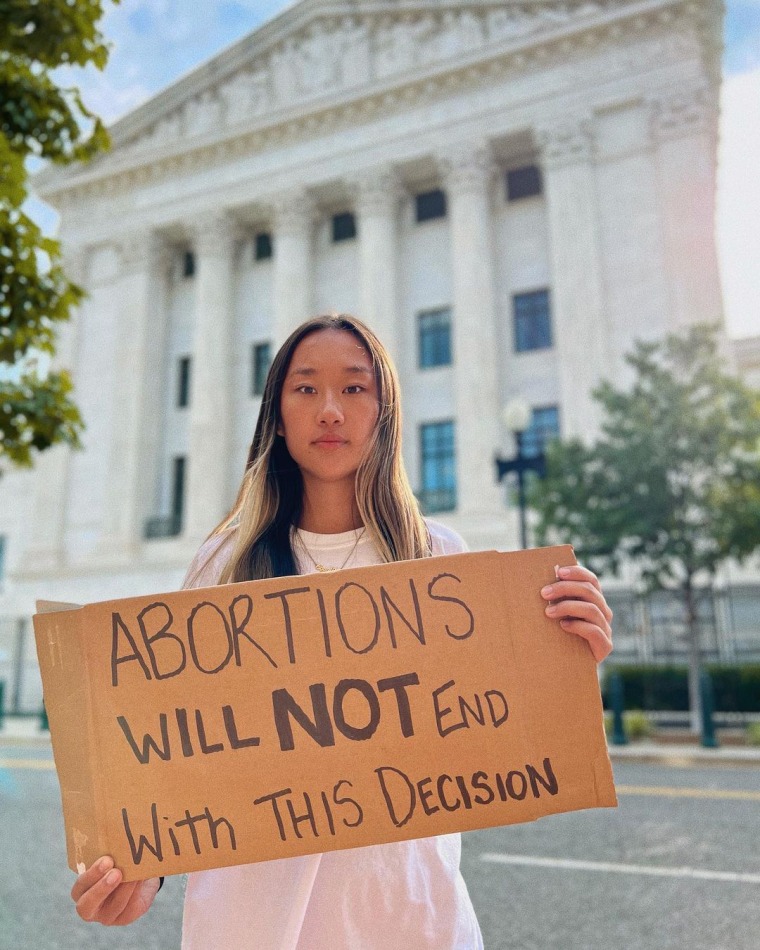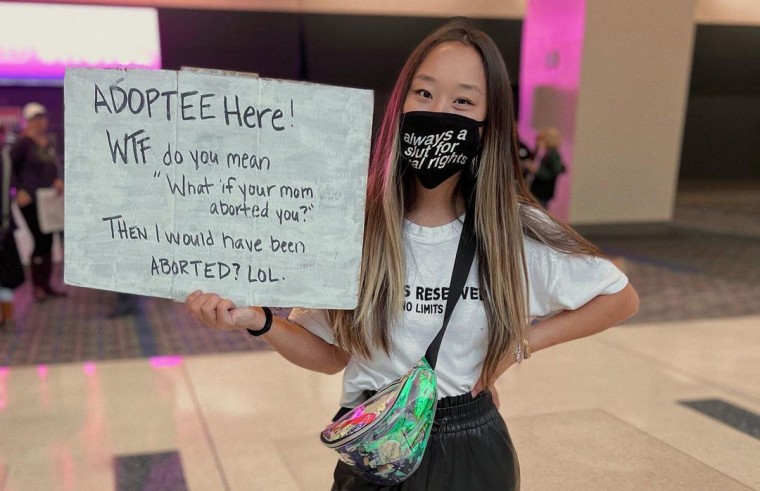Activist Annie Wu, a Chinese adoptee, said she’s repeatedly heard the question, “What if you were aborted?” It’s an all-too-common hypothetical that anti-abortion proponents have lobbed at adoptees who publicly defend reproductive rights, particularly amid the recent fall of Roe v. Wade.
”If my birth mother aborted me, that would be FINE with me. I would not exist so I would not care or be impacted,” Wu, a digital organizer with nonprofit PA Stands Up, wrote in an Instagram post.
Many adoptee activists who support abortion rights say they are uniquely positioned in the crosshairs of the debate: Their very existences are often “manipulated” to advance anti-abortion views — with adoption framed as the moral alternative to abortion. They find themselves vulnerable to harassment, their experiences questioned or made light of, and their agency too often removed in the fight, they say.
Wu, who said she’s received support from many in the adoptee community, said she has been accused of supporting “murder” and been asked hypothetical questions about if “someone was to walk up and kill you right now.”
“How do I grapple with that? That my existence was a winning argument in a debate that eradicated my own rights, the rights of so many other people and has set into motion what is probably going to be the unfurling of more civil rights across the board?”
Stephanie Drenka
Stephanie Drenka, a Korean adoptee and editor of Visible Magazine, told NBC News that adoptees have long been demanding an end to the weaponization of their stories from anti-abortion activists and those in power.
Justice Samuel Alito, for example, wrote on behalf of the majority opinion in the Dobbs v. Jackson case, that “a woman who puts her newborn up for adoption today has little reason to fear that the baby will not find a suitable home.”
“How do I grapple with that? That my existence was a winning argument in a debate that eradicated my own rights, the rights of so many other people and has set into motion what is probably going to be the unfurling of more civil rights across the board?” Drenka said.

With the landmark 1973 ruling overturned and almost two dozen states poised to ban or severely restrict abortion access, the backlash they’ve had to shoulder takes a toll, many adoptees say.
“The vitriol is just the assumption that as adoptees we don’t deserve to have a say in our reproductive rights because of our adopted status,” Drenka said.
“That’s just a pattern of the dehumanization and sort of the infantilization that adoptees face. We are seen as commodities from birth and then when we grow up and we speak our minds, we’re silenced.”
While the adoptee community is no monolith, more often pro-abortion activists are left validating their own experiences against adoptive parents or those whose lives are not touched by the process, rather than other adoptees. Becky Belcore, an advisory board member of the Adoptees for Justice project who’s a Korean adoptee, said that adoptees most often field hypothetical questions around how they would feel if they were aborted. Many anti-abortion activists, she said, have attempted to remind adoptees that they would not be alive had the choice been given. But Wu said that the argument is moot.
“To me, it’s just like saying, ‘Well, what if your parents were just tired that night?’ Or ‘What if you used a condom that night?’” she said.
Being told to feel ‘grateful’ for being adopted and other adoptee trauma
The activists also said they face implications that they should be “grateful” to be alive. Drenka said she’s heard adoption described with sunny terms like “blessing” and that adoptees should feel “lucky.” She added that like many others, on the surface, her own story reads like a happy ending.
However, outsiders fail to calculate the loss that’s integral to every adoption.
“We had no control over our situation. As much as any person who is born can be grateful to be alive, this is just the life that we have.”
Becky Belcore
“I spent three months with a foster mother and then was adopted by a very loving white family and I had all of the opportunities in the world. I actually found my birth family and have a relationship with them,” she said. “But what people don’t like to think about is the trauma that my birth mother experienced when she had to relinquish me, as my birth father forced her to do that.”
Belcore emphasized that adoptees, of course, have no obligation to feel grateful.
“We had no control over our situation. As much as any person who is born can be grateful to be alive, this is just the life that we have,” she said. “It is our experience. Some of it has been really terrible for people.”
Because of the significant amount of transnational and interracial adoptions, some adoptees deal with racist or xenophobic comments, as well. Wu said she finds that some commenters tend to fixate on her background as a woman of Chinese descent.
“They’re just telling me to go back to China, or I should be grateful that I’m not living under the Chinese government,” Wu said, adding that oftentimes commenters will elaborate, painting China as a particularly oppressed nation.
Not only are the comments racist, Wu said, but they’re also “hypocritical.”
“What the United States government is doing now is controlling part of the population that’s able to reproduce and telling them that they have to reproduce.”
But many who support abortion rights have also been guilty of making light of adoption, too, the activists said. After a photo of a couple holding a “we will adopt your baby” poster went viral following the end of Roe, others turned the picture into a viral meme, poking fun at those who ascribe to the notion of adoption as a solution.
“In general, when discussing any of this, people should be making sure they’re not just using something as a talking point — you’re actually advocating for the people behind it.”
Annie Wu
Belcore and Wu both said that the use of humor in the situation is understandable as a way to cope and illustrate absurdity. But Wu underscored that these memes can also be insensitive without context.
“In general, when discussing any of this, people should be making sure they’re not just using something as a talking point — you’re actually advocating for the people behind it,” Wu said.
Belcore said the issue, quite simply, is too heavy to be fully represented in a meme.
“If anyone thought about how they’d been separated from their birth parents and grew up in another family, that would have pretty serious consequences on your life,” she said. “If you just take a moment to think about that, then you would be more curious to learn more about it.”
Adoptees say they have to hold ‘multiple things as true simultaneously’
Adoptees say that the backlash can be difficult to stomach, particularly for those who did not have good experiences with their adoptive families. Belcore said that these conversations can potentially be a trigger.
“Those of us that did not have good adoption placements, it makes people pretty angry, because many don’t think about what happens to the life of the child after they’re adopted and the long lasting impact of that as we grow into adults,” Belcore said. “That’s pretty infuriating.”
Drenka and Wu said they both have healthy, loving relationships with their adoptive parents and feel pressure to over-explain their stance so it’s not misconstrued. Both say the complexity in their experiences is too often erased or flattened.
“One of the most difficult aspects of being adopted is having to hold multiple things as true simultaneously,” Drenka said. “When things like this happen, I have to acknowledge that I did live a privileged life as an adoptee, and I also experienced trauma as an infant and ongoing trauma [from] being disconnected from my roots and not having access to information that most people take for granted.”
But Drenka said she’s not backing down and urges people to listen to adoptees’ stories.
“I feel like I’ve been practicing for this moment. I’ve been exercising what it means to tell my story in spaces that are not necessarily safe for several years,” Drenka said. “But we know that adoptees … are typically in spaces where we feel like we don’t belong or nobody understands. So I will continue to work to share my story if it just reaches one of them.”
